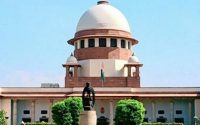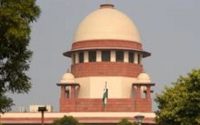$100 Website Offer
Get your personal website + domain for just $100.
Limited Time Offer!
Claim Your Website NowHear AAP’s plea on reserving 80 pc ICU beds for ,patients on Nov 12: SC to High Court
Source:-https://www.indiatvnews.com
The Supreme Court on Tuesday refused to grant any interim relief against the Delhi High Court order staying the AAP government’s decision to reserve 80 per cent ICU beds in 33 private hospitals for COVID-19 patients and ordered an urgent hearing on the plea on November 12. The top court asked the AAP government to approach the Delhi High Court, directing it to hear on Thursday the plea that was earlier listed before a division bench on November 27.
A vacation bench of Justices Ashok Bhushan and B R Gavai took note of the urgent plea of the Delhi government on the ground of a sudden spike in COVID-19 cases in the national capital.
The bench ordered that the matter be listed before the concerned division bench in the Delhi High Court on November 12 and it shall be open for the parties to submit such pleading before the bench as may be advised.
At the outset, Additional Solicitor General Sanjay Jain, appearing for Delhi government, said this is not adversarial litigation and it wants to continue with the 80 per cent reservation of ICU beds for COVID-19 patients after reviewing the situation and discontinuation of the same after few weeks when the situation normalizes.
The bench asked Jain to have a look at the order passed by the division bench which says it was on the request of the appellant (Delhi government) that the hearing was adjourned to November 27.
Jain replied that the counsel for Delhi government engaged to argue that day was diabetic and was not fit to argue the case and hence an adjournment was sought, but it cannot be November 27, as COVID cases are rising in the national capital.
The bench asked Jain why the Delhi government cannot request the High Court to prepone the hearing, tell about the urgency and pray for fixing an early date.
Jain submitted that in the last few days the number of COVID-19 cases have crossed 7,000 per day in the city.
The bench said it’s a fluctuating state as at one point it was 1,000 cases per day, but the Delhi government has not brought before the court any material on record to show that no beds are available to COVID-19 patients.
The Additional Solicitor General stated that a lot of people come from outside the state and get treated in private hospitals using ICU beds.
He said an expert committee has suggested that Delhi needs 6,000 ICU beds against the availability of 3,500 beds and if the notification is upheld then Delhi could have had 300 to 500 more beds.
He added that out of 133 hospitals, only 33 hospitals have been reserved.
The bench asked Jain to inform all these facts to the Delhi High Court.
Jain submitted that the operation of the impugned order of September 22 needs to stay or else the COVID-19 cases will rise beyond control.
Senior advocate Maninder Singh, appearing for the ‘Association of Healthcare Providers’, the original petitioner before the High Court, said the division bench can be asked to consider the matter whenever the court deems fit.
Jain urged the top court to ask the division bench of the High Court to consider the matter by Wednesday as once the damage is done, there will be no use of the hearing.
The bench — after noting the submissions of Jain and Singh that the matter needs to be heard urgently by the High Court because the COVID-19 situation in Delhi is worsening — asked the division bench to consider the matter on November 12.
The apex court’s vacation bench was hearing an appeal filed by the Delhi government against the high court’s September 22 order.
The apex court is on Diwali break this week.
A single judge bench of the high court on September 22 had stayed the Delhi government’s September 12 decision, saying that asking 33 big private hospitals to reserve 80 percent of ICU beds for COVID-19 patients would violate the fundamental rights of those having other health conditions.
The government has already challenged the single judge’s order before a division bench of the high court which had listed it for hearing on November 27.
While staying the Delhi government’s order, the high court had come down heavily on it asking whether the non-COVID-19 patients have a right to life or not.
It had observed that prima facie, the government’s order was “arbitrary, unreasonable and violative of fundamental rights of citizens” guaranteed under the Constitution
“The state cannot discriminate between a COVID-19 and a non-COVID-19 patient requiring emergent treatment. In the time of emergency, such patients cannot be told to run around finding a hospital where beds have not been reserved for COVID-19 patients. The disease itself cannot be a ground for such discrimination,” the single judge bench had said.
The single-judge bench had passed the order on a plea by the ‘Association of Healthcare Providers’ challenging the Delhi government’s September order.



